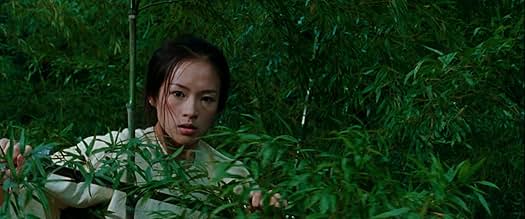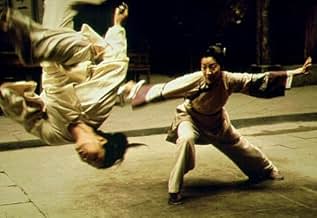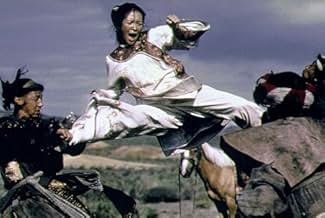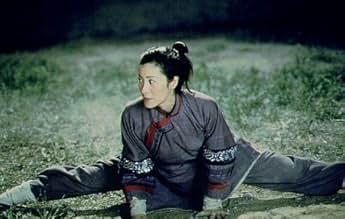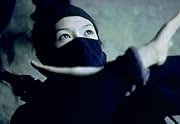Eine junge chinesische Kriegerin stiehlt einem berühmten Meister der Kampfkunst das Schwert und flüchtet dann in eine Welt voller romantischer Abenteuer mit einem mysteriösen Mann an der Gre... Alles lesenEine junge chinesische Kriegerin stiehlt einem berühmten Meister der Kampfkunst das Schwert und flüchtet dann in eine Welt voller romantischer Abenteuer mit einem mysteriösen Mann an der Grenze des Landes.Eine junge chinesische Kriegerin stiehlt einem berühmten Meister der Kampfkunst das Schwert und flüchtet dann in eine Welt voller romantischer Abenteuer mit einem mysteriösen Mann an der Grenze des Landes.
- 4 Oscars gewonnen
- 101 Gewinne & 132 Nominierungen insgesamt
Chow Yun-Fat
- Master Li Mu Bai
- (as Chow Yun Fat)
Ziyi Zhang
- Jen
- (as Zhang Ziyi)
Pei-Pei Cheng
- Jade Fox
- (as Cheng Pei-Pei)
Deming Wang
- Tsai
- (as Wang De Ming)
Suying Huang
- Auntie Wu
- (as Huang Su Ying)
Jinting Zhang
- De Lu
- (as Zhang Jin Ting)
Jianhua Feng
- Gou Jun Sinung
- (as Feng Jian Hua)
Zhenxi Du
- Shop Owner
- (as Du Zhen Xi)
Cheng Lin Xu
- Captain
- (as Xu Cheng Lin)
Empfohlene Bewertungen
As Ang Lee, I grew up reading wuxia novels in Taiwan. Those novels usually mixed engrossing history, thrilling action, enchanting romance. But when these novels were made into movies or TV series, none of them could match my imagination. It's either because of wrong casting, bad acting, tedious costumes, sloppy storytelling, minimal budget (so everything is shot in studio rather than in the grand Chinese landscapes as they were told in books), fake action... I could go on and on. Now Ang Lee finally made a wuxia film that captures my imagination and fulfills my dream of childhood.
The casting of CTHD is perfect. No disrespect to Jet Li, but Jet Li would not make Li Mu Bai into what he should be: noble, wise but weary. Chow Yun Fat conveys the unspoken feelings of Li Mu Bai in a way I can't imagine anyone else can. But he's known for his acting, Michelle Yeoh was known for her fighting skills. Here in CTHD, she proves herself as an excellent dramatic actress. The secrete longing for Li and the confusion of Li's true feelings were clearly conveyed by her eyes. The scenes between them are heartbreaking. Zhang Zi Yi is a true discovery! What a wonderful talent to steal scenes after scenes from the veterans around her. She ran from looking innocent, haughty, feisty to loving and distraught. She made the complex Jen a real flesh and blood believable human being. Chang Chen made a perfectly sexy and charming bandit.
The scenery and the photography was beyond belief. The majestic landscapes of China match my imagination when I read all the beautiful Chinese poems of the Tang and Sung dynasties. No wonder those poets could come up with those masterpieces. They sure had the best inspiration. Peter Pau not only captured the landscapes and the settings, he also managed to capture the fast-as-lightening action wonderfully. The shot of Jen gliding over water just lodged in my mind. The soundtrack is also excellent. Tan Dun used different instruments to match the different locales. He mixed in Central Asian music in the desert sequence and Chinese flute in the Southern China scenes. Yo-yo Ma's cello in the main theme makes me want to weep everytime I hear it.
The storytelling was also done expertly. As a romantic-at-heart, I love the desert romance between Jen and Lo. It's one of the most charming and believable love stories that I can remember. Most people gave credit of the fighting to Yuen Wo Ping. I'd give kudos to Ang Lee. I've seen Yuen's martial art films before, but they're never done in such an imaginative and artistic way. The artistic vision has to come from Ang Lee.
To sum it up, three cheers for Ang Lee! You not only fulfilled your childhood dream, you fulfilled mine too. It's such a pleasure to finally see a wuxia novel be done right. Thank you! Thank you! Thank you!
The casting of CTHD is perfect. No disrespect to Jet Li, but Jet Li would not make Li Mu Bai into what he should be: noble, wise but weary. Chow Yun Fat conveys the unspoken feelings of Li Mu Bai in a way I can't imagine anyone else can. But he's known for his acting, Michelle Yeoh was known for her fighting skills. Here in CTHD, she proves herself as an excellent dramatic actress. The secrete longing for Li and the confusion of Li's true feelings were clearly conveyed by her eyes. The scenes between them are heartbreaking. Zhang Zi Yi is a true discovery! What a wonderful talent to steal scenes after scenes from the veterans around her. She ran from looking innocent, haughty, feisty to loving and distraught. She made the complex Jen a real flesh and blood believable human being. Chang Chen made a perfectly sexy and charming bandit.
The scenery and the photography was beyond belief. The majestic landscapes of China match my imagination when I read all the beautiful Chinese poems of the Tang and Sung dynasties. No wonder those poets could come up with those masterpieces. They sure had the best inspiration. Peter Pau not only captured the landscapes and the settings, he also managed to capture the fast-as-lightening action wonderfully. The shot of Jen gliding over water just lodged in my mind. The soundtrack is also excellent. Tan Dun used different instruments to match the different locales. He mixed in Central Asian music in the desert sequence and Chinese flute in the Southern China scenes. Yo-yo Ma's cello in the main theme makes me want to weep everytime I hear it.
The storytelling was also done expertly. As a romantic-at-heart, I love the desert romance between Jen and Lo. It's one of the most charming and believable love stories that I can remember. Most people gave credit of the fighting to Yuen Wo Ping. I'd give kudos to Ang Lee. I've seen Yuen's martial art films before, but they're never done in such an imaginative and artistic way. The artistic vision has to come from Ang Lee.
To sum it up, three cheers for Ang Lee! You not only fulfilled your childhood dream, you fulfilled mine too. It's such a pleasure to finally see a wuxia novel be done right. Thank you! Thank you! Thank you!
10j30bell
Crouching Tiger is Ang Lee's take on the Wu Xia tradition of film making. Wu Xia, for those not familiar with the style, evolved out of popular Chinese fiction. It contains formulaic elements such as honourable warriors, powerful swordswomen, powerful swords, and often magic and mythical beasts. Possibly, it has a parallel with sword and sorcery pulp literature and even Western romances.
Although he grew up in Taiwan, not Hong Kong or China, Ang Lee has said he has always wanted to make a Wu Xia film. When he did, he brought sophistication and strong production values which, while not uncommon in mainstream Chinese cinema, was less common in the martial arts or Wu Xia traditions.
Make no mistake; Crouching Tiger is a beautiful, beautiful movie. The colours are rich, the light dances and the movements are balletic. But unlike lesser imitations, such as Hero, it is much more than that just stylish production and mesmerising action.
Most films (Western or Eastern) have a rigid plot against which characters move. At worst the characters become ciphers; they advance the story by making choices regardless of whether these choices are in keeping with their character. Crouching Tiger, like the best of cinema, has dynamic characters whose internal struggles advance the plot. The dog wags the tail, not the other way around.
At the heart of Crouching Tiger is the relationship between Li Mu Bai (Chow Yun-Fat) and Yu Shu Lien (Michelle Yeoh). Mu Bai is looking for a way out of the Gang Ho (Warrior) lifestyle he joins a monastery, as a route to enlightenment and peace, but cannot cast aside his unrequited love for Shu Lien (another warrior). On the brink of declaring their love for one another, Mu Bai's Green Destiny Sword is stolen, and his arch enemy returns. He must temporarily put aside his feelings to recover the sword and bring his master's killer to justice Seeming to take a fair chunk from his previously directorial role, Sense and Sensibility, Ang Lee weaves a story which tragically juxtaposes the loving and giving but repressed relationship of Mu Bai and Shu Lien, with the fiery, wilful and destructive passions of Jen Yu (Zhang Ziyi) and Lo (Chang Chen). The result, for me, was breathtaking.
Some critics have suggested that the characterisation is quite slight. I think this just demonstrates the high standard to which they were prepared to judge this film. Ang Lee perfectly marries action/adventure with drama. The results may not please purists from either camp, but for the rest of the audience it is pure magic.
In many ways, Crouching Tiger Hidden Dragon is pure Wu Xia. But it has also re-invented the genre and given it artistic credibility. The greatest joy of the film is watching great Hong Kong stars like Chow Yun-Fat and Michelle Yeoh being given characters with depth and watching them fill the screen with their performances. The film also benefits from great performances from Zhang Ziyi and a very under-rated Chang Chen.
Quite simply, Crouching Tiger has everything. It is beautiful, breathtaking and deeply moving. 9½ /10
Although he grew up in Taiwan, not Hong Kong or China, Ang Lee has said he has always wanted to make a Wu Xia film. When he did, he brought sophistication and strong production values which, while not uncommon in mainstream Chinese cinema, was less common in the martial arts or Wu Xia traditions.
Make no mistake; Crouching Tiger is a beautiful, beautiful movie. The colours are rich, the light dances and the movements are balletic. But unlike lesser imitations, such as Hero, it is much more than that just stylish production and mesmerising action.
Most films (Western or Eastern) have a rigid plot against which characters move. At worst the characters become ciphers; they advance the story by making choices regardless of whether these choices are in keeping with their character. Crouching Tiger, like the best of cinema, has dynamic characters whose internal struggles advance the plot. The dog wags the tail, not the other way around.
At the heart of Crouching Tiger is the relationship between Li Mu Bai (Chow Yun-Fat) and Yu Shu Lien (Michelle Yeoh). Mu Bai is looking for a way out of the Gang Ho (Warrior) lifestyle he joins a monastery, as a route to enlightenment and peace, but cannot cast aside his unrequited love for Shu Lien (another warrior). On the brink of declaring their love for one another, Mu Bai's Green Destiny Sword is stolen, and his arch enemy returns. He must temporarily put aside his feelings to recover the sword and bring his master's killer to justice Seeming to take a fair chunk from his previously directorial role, Sense and Sensibility, Ang Lee weaves a story which tragically juxtaposes the loving and giving but repressed relationship of Mu Bai and Shu Lien, with the fiery, wilful and destructive passions of Jen Yu (Zhang Ziyi) and Lo (Chang Chen). The result, for me, was breathtaking.
Some critics have suggested that the characterisation is quite slight. I think this just demonstrates the high standard to which they were prepared to judge this film. Ang Lee perfectly marries action/adventure with drama. The results may not please purists from either camp, but for the rest of the audience it is pure magic.
In many ways, Crouching Tiger Hidden Dragon is pure Wu Xia. But it has also re-invented the genre and given it artistic credibility. The greatest joy of the film is watching great Hong Kong stars like Chow Yun-Fat and Michelle Yeoh being given characters with depth and watching them fill the screen with their performances. The film also benefits from great performances from Zhang Ziyi and a very under-rated Chang Chen.
Quite simply, Crouching Tiger has everything. It is beautiful, breathtaking and deeply moving. 9½ /10
I just saw this film today. I was totally captivated... when it was all over, and the credits began to run, it took me a couple of seconds to realize where I was. I didn't want to get out of my seat. And once I got out of the theatre, I couldn't even talk about it for an hour or so. I kept running the details over and over in my head. It's rare that a film has such an impact on me. The cinematography was stunning. The special effects were beautifully done. The characters' moves were effortless. The acting was wonderful. I really think that Michelle Yeoh should have been nominated for an Oscar for Best Actress. I thought that the effects and storyline complimented each other brilliantly. There were so many different layers to the plot. There were many things that couldn't be explained with dialogue that were expressed in the characters' faces. This film had lighthearted moments, heartwrenching moments, romantic interludes, inspirational sentiments, wonderful plot twists, superb acting, beautifully done fight scenes, never before seen special effects...it had it all. Some scenes may have been a little over the top, but it's *fantasy*... and yet, after a few brief moments, it somehow became completely believable. That's how much this film draws you in. This is a one of a kind film; there is just no comparing it to any other. It transports you to another place and time. I highly recommend it.
What people who aren't Chinese and who don't know much about Chinese culture fail to understand, is that the warrior mythology portrayed in films like Crouching Tiger, Hidden Dragon and Hero has its roots in a particular genre of fiction that has been around much longer than television or film.
Having grown up reading a bunch of these stories of epic fantasy, I remember being surprised when I went to watch CTHD in the theaters, and saw the audience break out in laughter at the flying stunts. I suppose the concept probably does seem ridiculous to foreigners.
The whole deal with the flying is this:
In the stories, the world of "Giang Hu" mentioned in CTHD is the unconventional part of society in which the characters that practice high transcendent martial arts exist. "Giang Hu" literally translates to something like "lakes and rivers", which kind of is a cultural allusion to the fact that most of these people wander a whole lot participating in great duels of swordsmanship and all kinds of tragic drama.
One of the forms of transcendent martial arts is "chin guon", which translates to something like "the art of lightness". It's a skill that these warrior folk develop from a young age using various methods that make it so they can move as if they were light as a feather. I think the idea is that they're trained so that they progressively have less and less of a perception of their own weight, and thus they can run up walls and fly across rooftops in style.
There's another type of martial art which involves transmitting "chi" (spiritual essence or whatever you want to call it) through your hands or fingertips and into the pressure points of others, either doing them harm, rendering them unable to move, or restoring some of their strength.
If you don't understand that it's another culture's fiction/mythology and can't get over that it defies known physics and medicine etc., well, too bad.
At the same time, look at acupuncture. Millions swear by the benefits of acupuncture. Hell, my father had a stroke that paralyzed half his face and went to four separate doctors. They couldn't do a damn thing. He then went to an acupuncturist and after two sessions the paralysis was gone. Conventional medicine still has no idea how acupuncture could possibly work, yet a lot of doctors will accept it as a viable option. Who the hell knows, maybe once upon a time in China people could fly.
I find Chinese warrior mythology pretty interesting, and the problem is that these novels do not translate well. I'm not sure if anyone has ever tried. A lot of what goes on in them has a lot of cultural relevance and wouldn't be readily understood by certain people who have Western sensibilities. Hong Kong and Taiwan have for a couple of decades produced a lot of television shows that portray these stories, but they're mostly pretty cheesy like American soap operas.
Which is why CTHD is semi-important as a film. It's the first film to expose a lot Americans to this facet of Chinese mythology, and I hope it's not the last.
Having grown up reading a bunch of these stories of epic fantasy, I remember being surprised when I went to watch CTHD in the theaters, and saw the audience break out in laughter at the flying stunts. I suppose the concept probably does seem ridiculous to foreigners.
The whole deal with the flying is this:
In the stories, the world of "Giang Hu" mentioned in CTHD is the unconventional part of society in which the characters that practice high transcendent martial arts exist. "Giang Hu" literally translates to something like "lakes and rivers", which kind of is a cultural allusion to the fact that most of these people wander a whole lot participating in great duels of swordsmanship and all kinds of tragic drama.
One of the forms of transcendent martial arts is "chin guon", which translates to something like "the art of lightness". It's a skill that these warrior folk develop from a young age using various methods that make it so they can move as if they were light as a feather. I think the idea is that they're trained so that they progressively have less and less of a perception of their own weight, and thus they can run up walls and fly across rooftops in style.
There's another type of martial art which involves transmitting "chi" (spiritual essence or whatever you want to call it) through your hands or fingertips and into the pressure points of others, either doing them harm, rendering them unable to move, or restoring some of their strength.
If you don't understand that it's another culture's fiction/mythology and can't get over that it defies known physics and medicine etc., well, too bad.
At the same time, look at acupuncture. Millions swear by the benefits of acupuncture. Hell, my father had a stroke that paralyzed half his face and went to four separate doctors. They couldn't do a damn thing. He then went to an acupuncturist and after two sessions the paralysis was gone. Conventional medicine still has no idea how acupuncture could possibly work, yet a lot of doctors will accept it as a viable option. Who the hell knows, maybe once upon a time in China people could fly.
I find Chinese warrior mythology pretty interesting, and the problem is that these novels do not translate well. I'm not sure if anyone has ever tried. A lot of what goes on in them has a lot of cultural relevance and wouldn't be readily understood by certain people who have Western sensibilities. Hong Kong and Taiwan have for a couple of decades produced a lot of television shows that portray these stories, but they're mostly pretty cheesy like American soap operas.
Which is why CTHD is semi-important as a film. It's the first film to expose a lot Americans to this facet of Chinese mythology, and I hope it's not the last.
Less than half an hour into the viewing of this masterpiece I knew this would become one of my favorite films - of all time. Only in my wildest dreams (quite literally, this movie has touched me on a personal level) have I visualized such fantastic and precise choreography, so captivating that to take your eyes away during the intense confrontations is to deny yourself the essence of what makes this film so wonderful.
With an artistic license unprecedented, the action scenes are entirely unbelievable but purely the work of a fabulous imagination. The magical settings and the colorful characters fit well into the plot but you will take away the breath-taking martial arts sequences.
With an artistic license unprecedented, the action scenes are entirely unbelievable but purely the work of a fabulous imagination. The magical settings and the colorful characters fit well into the plot but you will take away the breath-taking martial arts sequences.
Wusstest du schon
- WissenswertesMichelle Yeoh deliberately did not work for a year before filming began so she could concentrate on training and learning Mandarin.
- Patzer(at around 1h 30 mins) During the fight between Yu Shu Lien and Xiou Long, many floor tiles are smashed by Shu Lien. After Shu Lien discards her heavy metal weapon and continues to fight, the tiles appear intact.
- Crazy CreditsThe opening title appears in Chinese and English.
- Alternative VersionenAn English dubbed version was created for the home video market.
- SoundtracksA Love Before Time
Music Composed by Jorge Calandrelli, Dun Tan
Lyrics by James Schamus, Elaine Chow (Translation)
Performed by Coco Lee featuring Cello Solo by Yo-Yo Ma
Coco Lee appears courtesy of Sony Music Entertainment (Holland) B.V.
Top-Auswahl
Melde dich zum Bewerten an und greife auf die Watchlist für personalisierte Empfehlungen zu.
Details
- Erscheinungsdatum
- Herkunftsländer
- Offizieller Standort
- Sprachen
- Auch bekannt als
- Im Reich der Tiger und Drachen
- Drehorte
- Produktionsfirmen
- Weitere beteiligte Unternehmen bei IMDbPro anzeigen
Box Office
- Budget
- 17.000.000 $ (geschätzt)
- Bruttoertrag in den USA und Kanada
- 128.530.421 $
- Eröffnungswochenende in den USA und in Kanada
- 663.205 $
- 10. Dez. 2000
- Weltweiter Bruttoertrag
- 213.978.518 $
- Laufzeit2 Stunden
- Farbe
- Sound-Mix
- Seitenverhältnis
- 2.39 : 1
Zu dieser Seite beitragen
Bearbeitung vorschlagen oder fehlenden Inhalt hinzufügen


